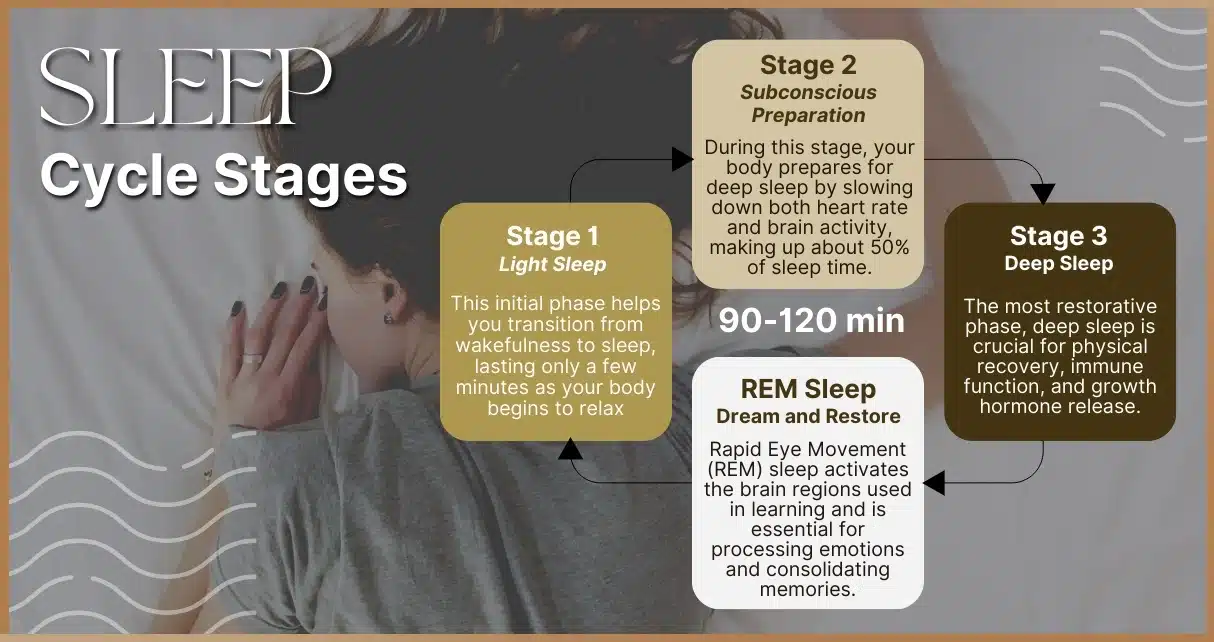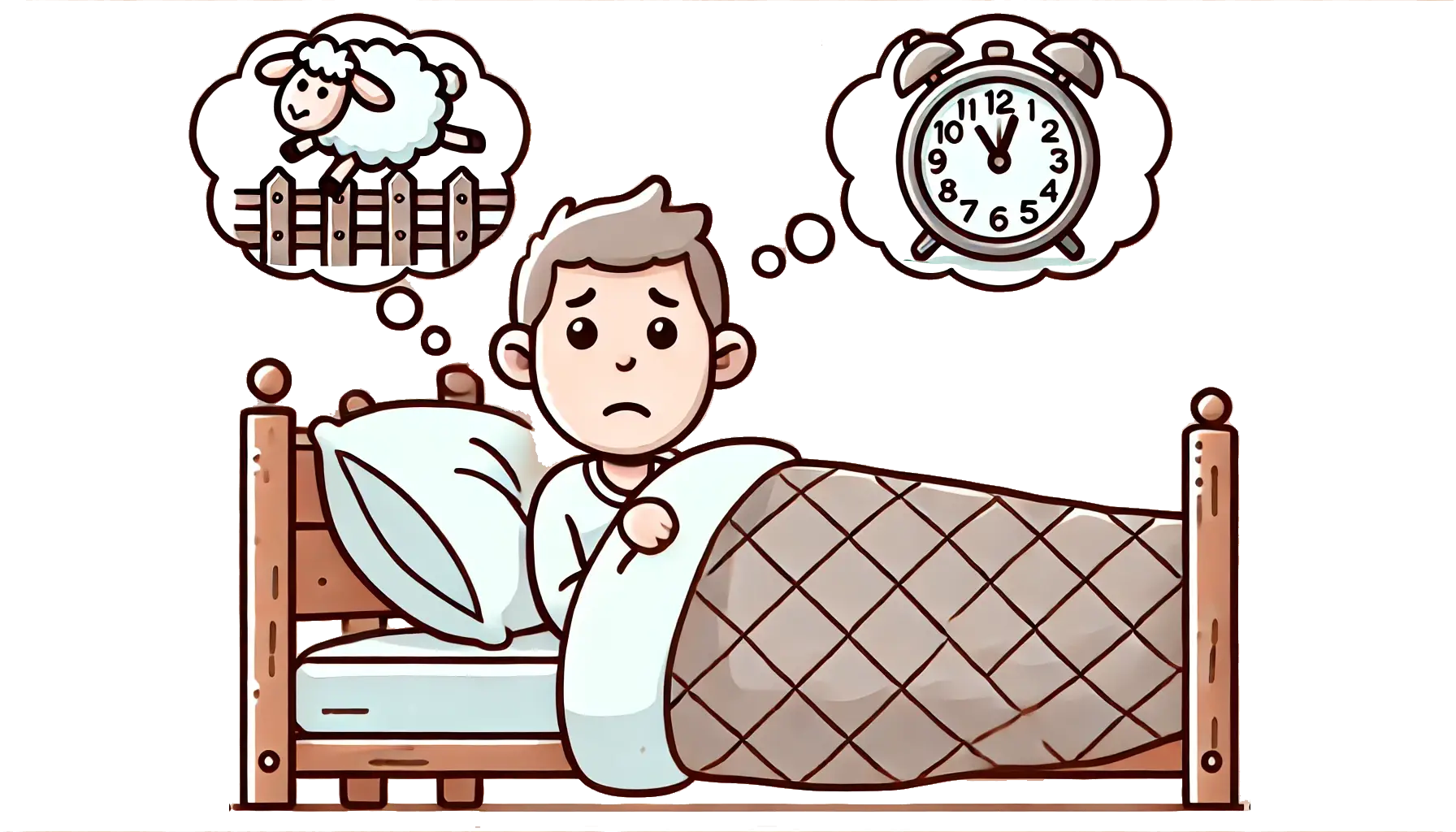
05 Jul Why Sleep Quality is Your Secret Weapon for Vitality?
Sleep quality is considered a luxury by many, but it’s as essential to your well-being as food and water. Sleep affects your health, sharpens your mind, and ultimately improves your daily performance. This article kicks off a planned series on the factors that affect our vitality. First, we’ll look at how a good night’s sleep can make you feel more alive, and offer some tips on how to make the most of it for a healthier lifestyle.
“Your human bio-energy and vitality isn’t just down to one thing. It’s a combination of different factors. The most important thing that affects your energy levels is getting enough sleep, rest and relaxation,” says Dr. George Egely.
Why Do We Need Sleep?
It is known that our body has two systems that keep us from getting too little rest:
- Sleep/wake homeostasis: This affects how much sleep we need and reminds us when it’s time to go to bed and control the intensity of our sleep.
- Circadian rhythm: This is what lets us fall asleep at night and wake up in the morning without an alarm clock. Jet lag and working multiple shifts, which is very common these days, can have a negative impact on our health.
Sleep is not the same as passive rest and relaxation because our bodies are actively repairing, consolidating memories, and regulating metabolism throughout this time.
As far as the sleep cycle is concerned, we go through different stages of sleep during a typical night, with REM (rapid eye movement) and non-REM stages playing a key role in energy recovery and mental health.

- Deep sleep rejuvenates our body and regulates metabolism.
- REM sleep enhances memory and manages stress. It is during this stage that the brain becomes active and we dream, and both studies and personal anecdotes suggest that the strange phenomenon of lucid dreaming may indeed occur at this point.
Several studies have found that not getting enough sleep increases our risk for a variety of health issues, including depression, heart disease, type 2 diabetes, and obesity, all of which affect many people in the twenty-first century.
See How to Measure Vitality Energy with a simple device.
The Secret to Better Sleep Quality
All in all, improving sleep quality is not just about quantity, but also about creating the right environment and the right habits:
- Avoid heavy meals and caffeine before bedtime.
- Keep your bedroom dark, quiet, and cool for a good night’s sleep.
- Establish a calming bedtime routine, such as reading or meditating.
- Reserve your bed for sleep and intimacy only.
- Minimize electronic distractions and light exposure at night to reduce the presence of electrosmog in your environment.
- Try to keep your daily naps to 30 minutes or less.
- A quick self-administered hand shiatsu massage can also work wonders to improve your sleep.
Remember that the key to success in any situation is consistency. Your body will only benefit from regular bedtimes and waking hours. Developing a regular practice of falling asleep and waking up naturally at the same time gets easier and easier as your body’s circadian rhythm improves.
If you try these suggestions and still have problems falling asleep or waking up during the night, you may have insomnia, sleep apnea, or restless legs syndrome. If so, it may be wise to consult a specialist who can help you determine the cause of the problem and offer possible solutions.
How Much Sleep Do We Need?
We all know that babies require the greatest sleep, which gradually decreases throughout childhood. As we age, our sleep requirements decrease by roughly seven to eight hours per night, but this varies from person to person based on our lifestyle, stress levels, and health. However, there are instances when we may require extra sleep, such as when we are studying hard, stressed, or ill.
It is important that you monitor how you feel throughout the day because it might help you determine whether you are getting enough sleep. For example, if you’re fatigued, having difficulties concentrating, or experiencing mood swings, it may be a clue that you should look into other ways to enhance your sleep quality since your sleep drive is off.
Improve Your Sleep Quality!
The Egely Wheel is the Universal Life Energy Meter, an easy and fun way to harness and monitor your life energy.
Discover why the Egely Wheel is so useful for improving your sleep quality and how it can help you create a healthy, stress-free lifestyle.
You should also consider the fact that as you age, your hormones may no longer function as well as they once did. Your body clock may be a little off. These factors can also make it more difficult to fall asleep, affect your sleep quality and increase your chances of cognitive deterioration.
According to Egely Wheel measurements, people who go to bed at around nine o’clock in the evening tend to wake up feeling more refreshed and having a lot more energy than normal because of their sleep quality. This is because utilizing artificial light after dark might interfere with our internal clocks and sleep drive, as most of us are naturally synchronized to the sun’s timetable.
This implies that it would be worthwhile to attempt this “natural” bedtime and reevaluate your routine to improve sleep quality if you’re feeling under the weather or have low energy for whatever reason.

One reason that earlier-onset sleep is more restorative is that you wake up earlier, which allows you to spend more time in natural light. The body also benefits from working with this ancient, built-in biological programming, which is further supported by the rhythmic periodicity of energy production throughout the day.
The experience of traveling across numerous time zones or using Daylight Saving Time and feeling as if your energy level has been “down” for days is the best way to express this deterioration in your sleep quality. Granted, there are individuals who truly come alive after 8 p.m. (think night owls), but for the most part, the aforementioned principles are true.
DID YOU KNOW ?
The Different Types of Sleep Patterns

For your lifestyle, are you receiving the best sleep possible? Over time, our sleep patterns have evolved significantly, moving from the standard monophasic sleep cycle to the unorthodox polyphasic one. Find out which of these several sleep patterns best suits your needs and which is ideal for you.
Monophasic sleep: This sleep pattern entails a single daily sleep session, usually lasting longer at night. The most typical sleep pattern in contemporary societies is this one. Sleeping for seven to eight hours at night, most individuals are awake and busy during the day.
Biphasic sleep: Historical accounts, particularly from medieval Europe, indicate that humans frequently slept in two phases. They would retire to bed in the evening, wake up at midnight after a few hours of sleep, spend an hour or two doing something productive (such as praying, reading, or even just paying a visit to a neighbor), and then return to sleep until dawn. This practice has altered with the development of artificial lights.
Polyphasic sleep: This sleep pattern is somewhere in between healthy sleep and insomnia. The strategy, which entails taking six 25-minute naps during the day and maybe sleeping for an hour at night, is becoming very popular on social media. Just be advised that sailors, physicians, soldiers, and other individuals who must sleep on this pattern benefit the most from it. If you are generally healthy and lead a typical lifestyle, there is no need to use this method solely for the purpose of extending your waking hours.
Your Action Plan for a Good Night’s Sleep and Vitality
Generally speaking, maintaining a balanced diet, engaging in regular physical activity, engaging in mental wellness practices, and being aware of your circadian rhythm are the greatest ways to ensure that you get a good night’s sleep. As you can see: Meeting our most basic needs requires a holistic approach to health and life in general.
Even if you can “tolerate” or “get used to” not getting enough sleep, that doesn’t mean it won’t hurt you in the long run. Above all, practicing good sleep hygiene is an active investment in your daily energy management and long-term health.
Because so much internal rebuilding occurs during sleep, we can compare it to shutting down a system. And we need to do this job if we want to wake up the next morning feeling rejuvenated and at our best.
6 Sources +
Egely Wheel has strict sourcing guidelines and relies on peer-reviewed studies, academic research institutions, and medical associations. We avoid using tertiary references.
- The Science of Sleep: Understanding What Happens When You Sleep – https://www.hopkinsmedicine.org/
- Sleep Drive and Your Body Clock – https://www.sleepfoundation.org/
- Normal Human Sleep : An Overview – http://apsychoserver.psych.arizona.edu/
- Daylight Saving Time: Everything You Need to Know – https://www.sleepfoundation.org/
- Slow Down With Shiatsu – https://www.amtamassage.org/
- Is sleeping through the night the ‘right’ way to sleep? – https://www.nationalgeographic.com/

